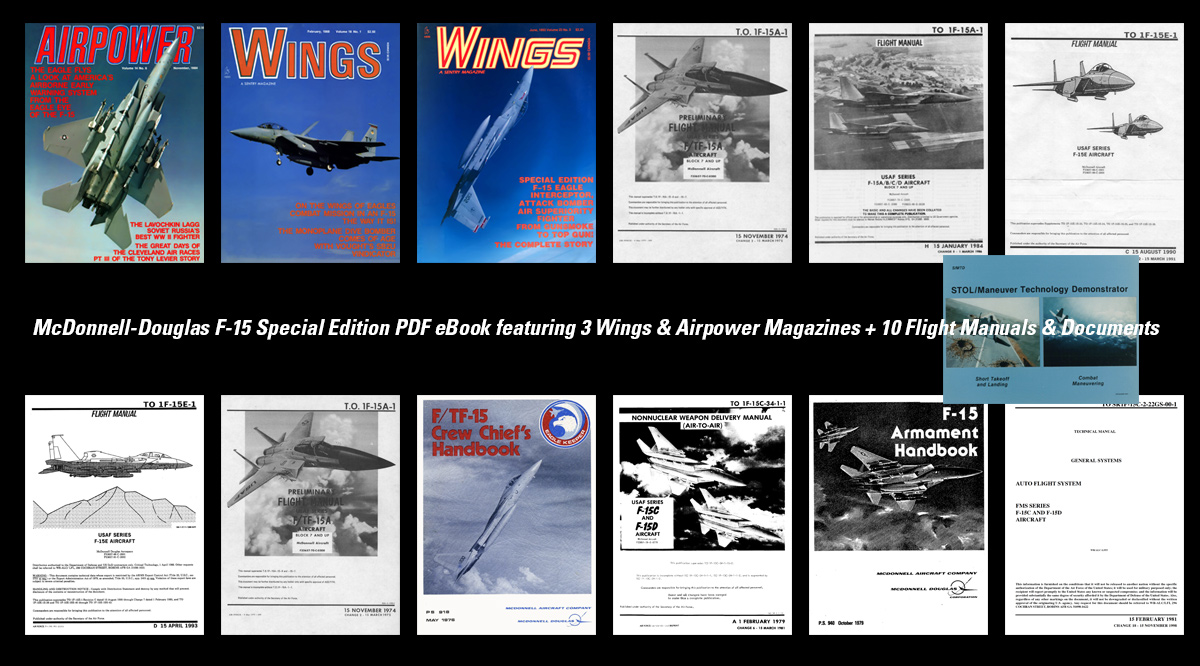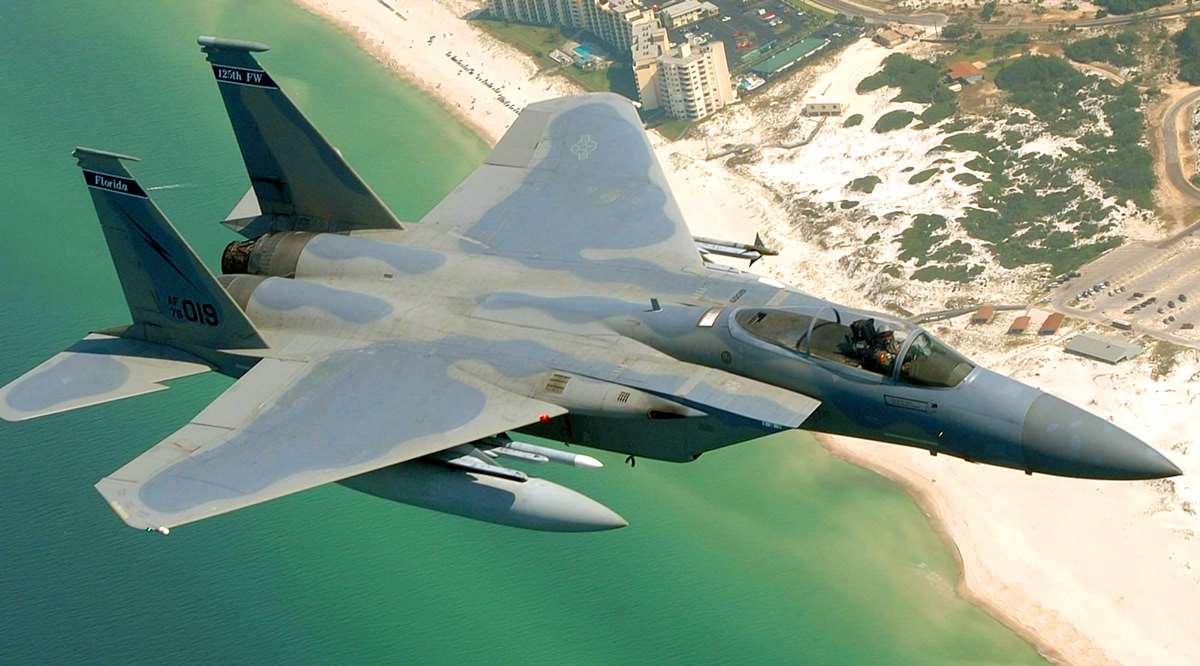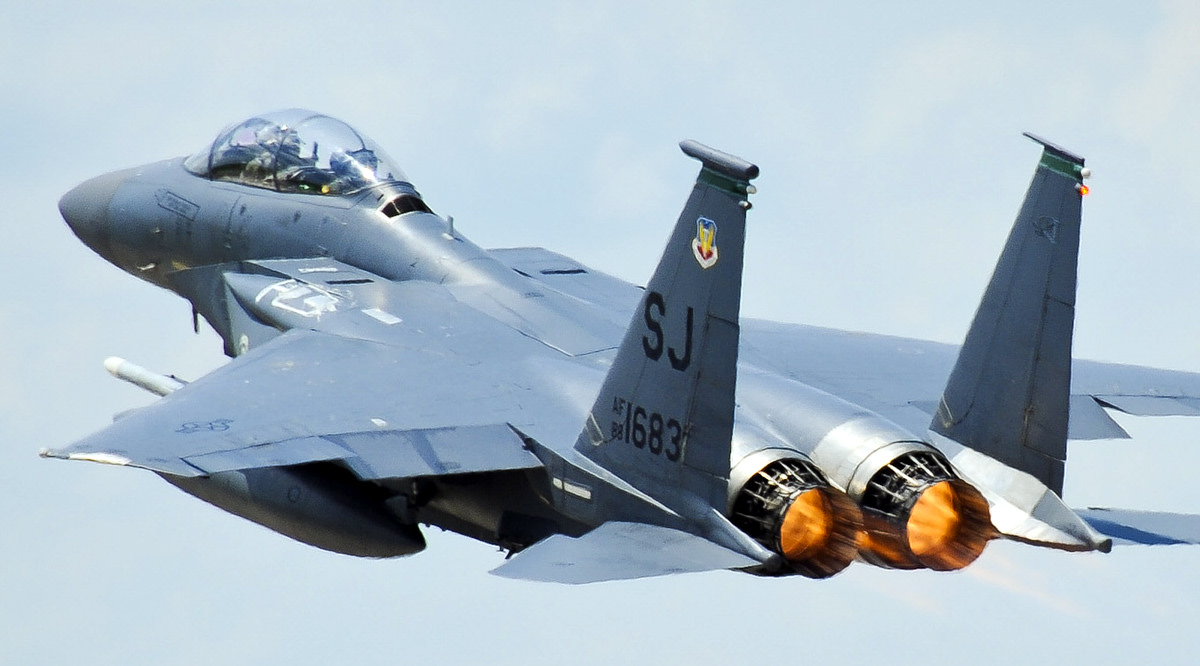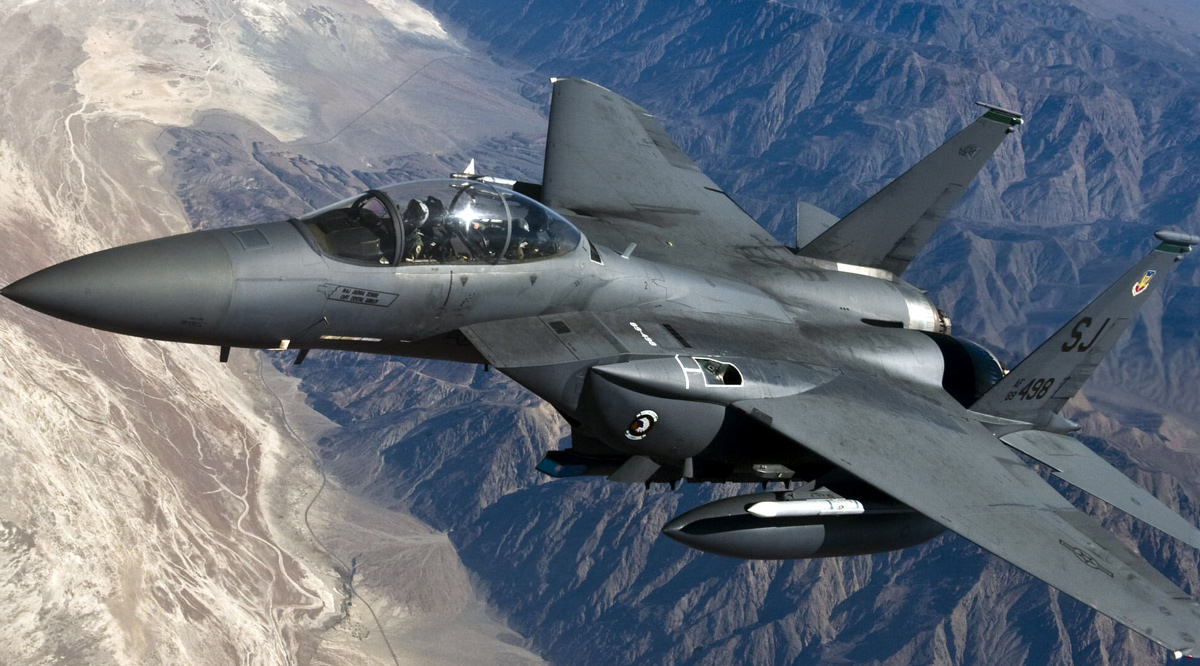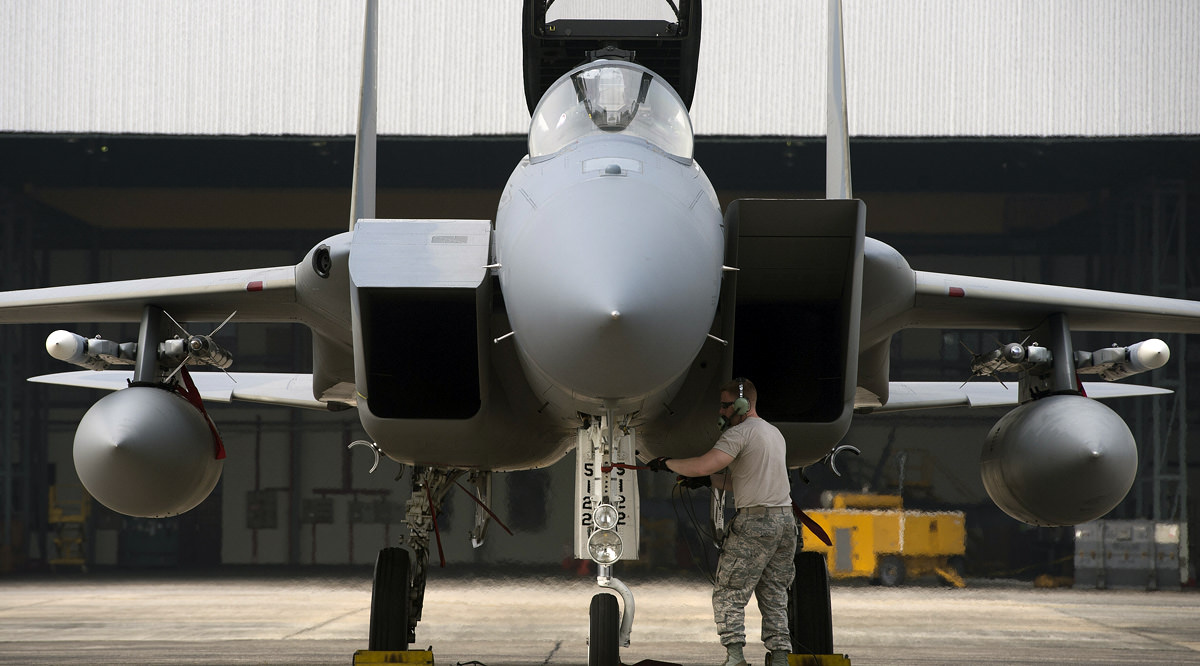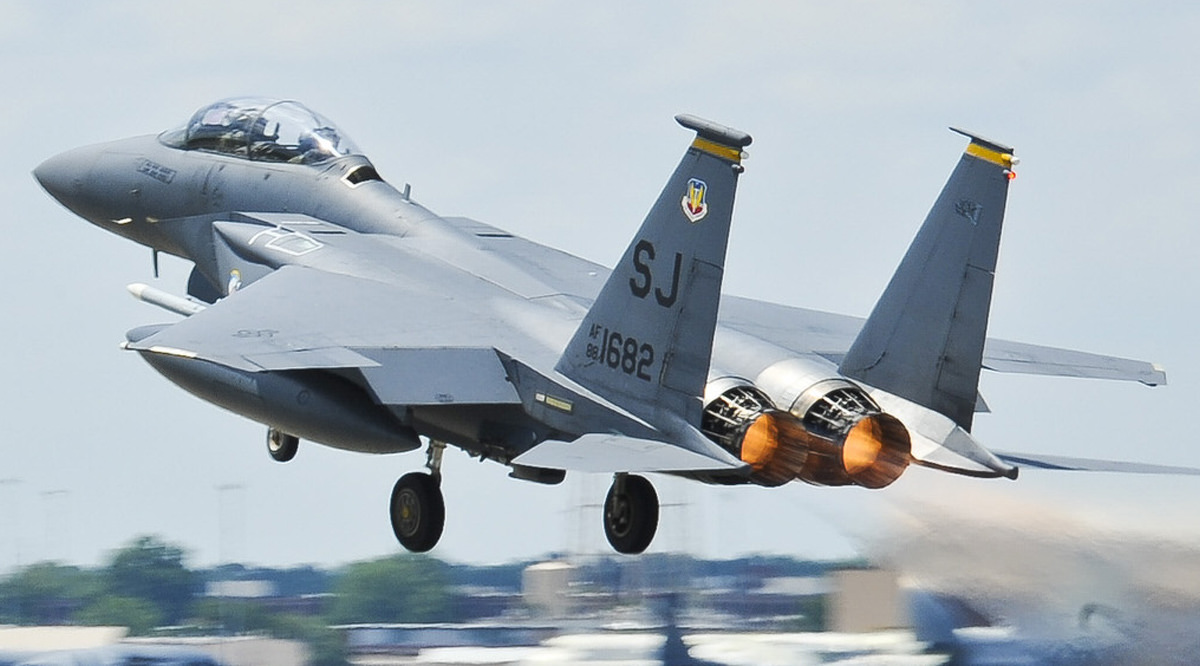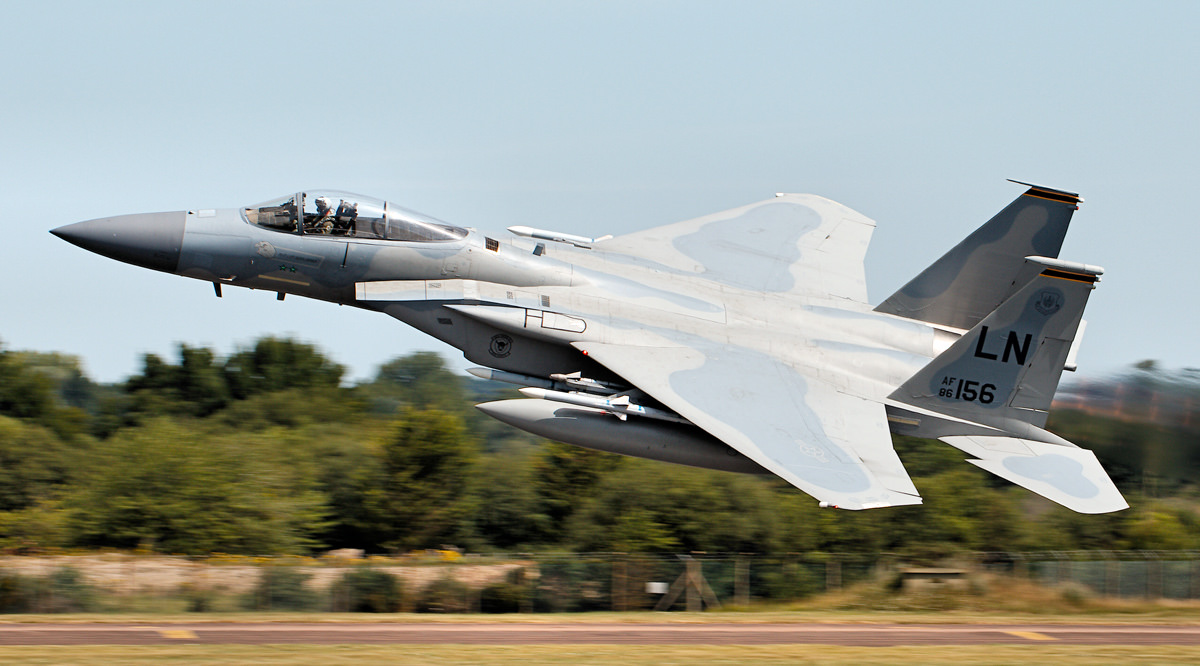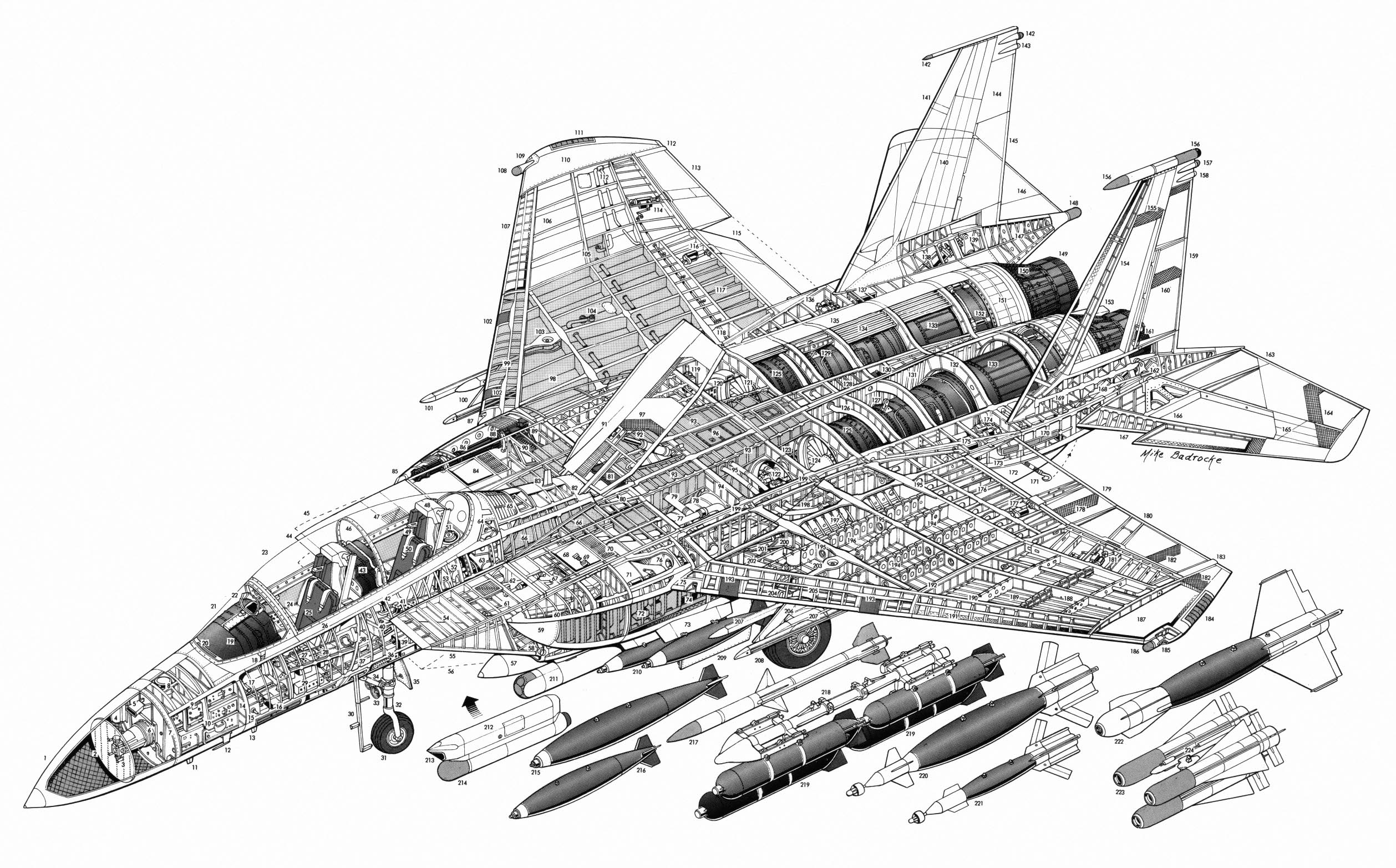Price: $24.95
- 3 magazines, 10 manuals, & photos
- PDF contains 2,963 pages
- Content is keyword searchable
- Print a personal copy
- Pay via PayPal or Credit Card
- International orders welcome!
- Download files upon payment
November 1984
- Airborne Early Warning System from the F-15 Eagle
- Lavochkin Lagg, Soviet Russia’s Best WWII Fighter
- Great Days of the Cleveland Air Races
- Part III of the Tony Levier Story
February 1988
- Mike Machat flies a combat intercept mission in an F-15
- Vought SB2U Vindicator, Monoplane Dive Bomber comes of age
June 1993
- Once An Eagle, the McDonnell-Douglas F-15
- William Tell, Covering the 1986 and 1992 Shoot Outs
Manuals & Photos
- F-15A Flight Manual, 1975
- F-15ABCD Flight Manual, 1985
- F-15E Flight Manual, 1991
- F-15E Flight Manual, 1993
- F/TF-15A Flight Manual, 1975
- F/TF-15 Crew Chief’s Handbook, 1976
- F-15 Armament Handbook, 1979
- F-15CD Auto Flight System, 1998
- F-15CD Non-Nuclear Weapon Delivery Manual, 1981
- McDonnell Douglas F-15 STOL/MTD Presentation, 1984
- Over 480 photos of the F-15 Eagle
McDonnell-Douglas F-15 Eagle
F-15C Specifications
Variants
On Display
Cutaway
Videos
General Characteristics
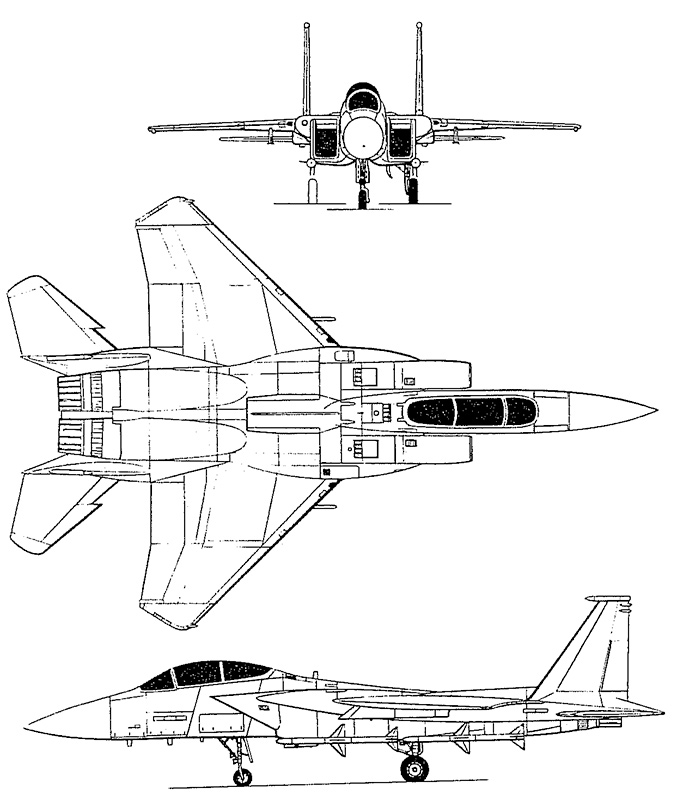
- Crew: 1: pilot
- Length: 63 ft 9 in (19.43 m)
- Wingspan: 42 ft 10 in (13.05 m)
- Height: 18 ft 6 in (5.63 m)
- Wing area: 608 ft² (56.5 m²)
- Airfoil: NACA 64A006.6 root, NACA 64A203 tip
- Empty weight: 28,000 lb (12,700 kg)
- Loaded weight: 44,500 lb (20,200 kg)
- Max. takeoff weight: 68,000 lb (30,845 kg)
- Fuel capacity: 13,455 lb (6,100 kg) internal
- Powerplant: 2 × Pratt & Whitney F100-PW-100 or ?220 afterburning turbofans
- Dry thrust: 14,590 lbf (64.9 kN) each
- Thrust with afterburner: 23,770 lbf for ?220 or 23,920 lbf for -100 (105.7 kN for ?220 or 106.4 kN for -100) each
Performance
- Maximum speed:
- High altitude: Mach 2.5+ (1,650+ mph, 2,665+ km/h)
- Low altitude: Mach 1.2 (900 mph, 1,450 km/h)
- Combat radius: 1,061 nmi (1,222 mi, 1,967 km) for interdiction mission
- Ferry range: 3,450 mi (3,000 nmi, 5,550 km) with conformal fuel tanks and three external fuel tanks
- Service ceiling: 65,000 ft (20,000 m)
- Rate of climb: >50,000 ft/min (254 m/s)
- Wing loading: 73.1 lb/ft² (358 kg/m²)
- Thrust/weight: 1.07 (?220) (1.26 with loaded weight at 50% internal fuel)
- Maximum design g-load: 9 g
Armament
- Guns: 1× 20 mm (0.787 in) M61A1 Vulcan 6-barrel Rotary cannon, 940 rounds
- Hardpoints: Total 11 (not including CFTs): two under-wing (each with additional two missile launch rails), four under-fuselage (for semi-recessed carriage of AIM-7 Sparrows) and a single centerline pylon station, optional fuselage pylons (which may include conformal fuel tanks, known initially as Fuel And Sensor Tactical (FAST) pack for use on the C model) with a capacity of 16,000 lb (7,300 kg) and provisions to carry combinations of:
- Missiles:
- 4× AIM-7 Sparrow
- 4× AIM-9 Sidewinder
- 8× AIM-120 AMRAAM
- Other:
- up to 3× 600 US gallons (2,300 L) external drop tanks for ferry flight or extended range/loitering time.
- MXU-648 Cargo/Travel Pod – to carry personal belongings, and small pieces of maintenance equipment.
- Missiles:
Avionics
- Joint Helmet Mounted Cueing System
- Radar:
- Raytheon AN/APG-63 or AN/APG-70 or
- Raytheon AN/APG-63(V)1 or
- Raytheon AN/APG-63(V)2 Active Electronically Scanned Array (AESA) or
- Raytheon AN/APG-63(V)3 Active Electronically Scanned Array (AESA)
- Countermeasures:
- Northrop Grumman Electronic Systems AN/ALQ-131 electronic countermeasures pod
- Hazeltine AN/APX-76 or Raytheon AN/APX-119 Identify Friend/Foe (IFF) interrogator
- Magnavox AN/ALQ-128 Electronic Warfare Warning Set (EWWS) – part of Tactical Electronic Warfare Systems (TEWS)
- Loral AN/ALR-56 Radar warning receivers (RWR) – part of TEWS
- Northrop Grumman Electronic Systems ALQ-135 Internal Countermeasures System (ICS) – part of TEWS
- Marconi AN/ALE-45 Chaff/Flares dispenser system – part of TEWS
- F-15A
- Single-seat all-weather air-superiority fighter version, 384 built in 1972–1979
- F-15B
- Two-seat training version, formerly designated TF-15A, 61 built in 1972–1979
- F-15C
- Improved single-seat all-weather air-superiority fighter version, 483 built in 1979–1985. The last 43 F-15Cs were upgraded with AN/APG-70 radar and later the AN/APG-63(V)1 radar.
- F-15D
- Two-seat training version, 92 built in 1979–1985.
- F-15J
- Single-seat all-weather air-superiority fighter version for the Japan Air Self-Defense Force 139 built under license in Japan by Mitsubishi Heavy Industries in 1981–1997, two built in St. Louis.
- F-15DJ
- Two-seat training version for the Japan Air Self-Defense Force. 12 built in St. Louis, and 25 built under license in Japan by Mitsubishi in the period 1981–1997.
- F-15N Sea Eagle
- The F-15N was a carrier-capable variant proposed in the early 1970s to the U.S. Navy as an alternative to the heavier and, at the time, considered as “riskier” technology program, the Grumman F-14 Tomcat. It did not have a long range radar or the long range missiles used by the F-14. The F-15N-PHX was another proposed naval version capable of carrying the AIM-54 Phoenix missile, but with an enhanced version of the AN/APG-63 radar on the F-15A. These featured folding wingtips, reinforced landing gear and a stronger tailhook for shipboard operation.
- F-15E Strike Eagle
- Two-seat all-weather multirole strike version, fitted with conformal fuel tanks. It was developed into the F-15I, F-15S, F-15K, F-15SG, F-15SA, and other variants.
- F-15SE Silent Eagle
- Proposed F-15E variant with a reduced radar cross-section.
- F-15 2040C
- Proposed upgrade to the F-15C, allowing it to supplement the F-22 in the Air-Superiority role. The 2040C concept is an evolution of the Silent Eagle proposed to South Korea and Israel, with some low-observable improvements but mostly a focus on the latest air capabilities and lethality. Proposal includes infra-red search and track, doubling the number of weapon stations, with quad racks for a maximum of 16 air-to-air missiles, Passive/Active Warning Survivability System, conformal fuel tanks, upgraded APG-63(v)3 AESA and a “Talon HATE” communications pod allowing data-transfer with the F-22.
- F-15X
- Proposed new build fighter to replace ageing F-15C.
Germany
- F-15A
- 74-0085 – Spangdahlem AB
- 74-0109 – Auto Technik Museum, Speyer
Netherlands
- F-15A
- 74-0083 (marked as 77-0132) – Nationaal Militair Museum, Kamp Zeist, former Camp New Amsterdam AB. Aircraft was based at Camp New Amsterdam and left as a gift when the base was closed in 1995
Japan
- F-15A
- 74-0088 – Kadena AB
Israel
- F-15A
- 73-0098 – Israeli Air Museum, Hatzerim
- 73-0107 – gate guard at Tel Nof AB
Saudi Arabia
- F-15D
- Royal Saudi Air Force Museum
United Kingdom
- F-15A
- 74-0131 – Wings of Liberty Memorial Park, RAF Lakenheath
- 76-0020 – American Air Museum, Duxford
United States
- F-15A
- 71-0280 – 37th Training Wing HQ Parade Ground, Kelly Field (formerly Kelly AFB), San Antonio, Texas
- 71-0281 – Tactical Air Command Memorial Park, Joint Base Langley-Eustis, Hampton, Virginia
- 71-0283 – Defense Supply Center Richmond, Richmond, Virginia
- 71-0285 – Boeing Avionic Antenna Laboratory, St. Charles, Missouri
- 71-0286 – A GF-15A; Saint Louis Science Center, St. Louis, Missouri, in storage. Previously on display at Octave Chanute Aerospace Museum, Rantoul, Illinois
- 72-0119 “Streak Eagle” – in storage at the National Museum of the United States Air Force, Wright-Patterson AFB, Dayton, Ohio
- 73-0085 – Museum of Aviation, Robins AFB, Warner Robins, Georgia
- 73-0086 – Louisiana Military Museum, Jackson Barracks, New Orleans, Louisiana
- 73-0099 (Marked as 77-0099) – Robins AFB, Warner Robins, Georgia
- 74-0081 – Elmendorf AFB, Alaska
- 74-0084 – Alaska Aviation Heritage Museum, Anchorage, Alaska
- 74-0095 – Tyndall AFB, Panama City, Florida
- 74-0114 – Mountain Home AFB, Idaho
- 74-0117 – Langley AFB, Virginia
- 74-0118 – Pima Air & Space Museum, adjacent to Davis-Monthan AFB, Tucson, Arizona
- 74-0119 – Castle Air Museum, Atwater, California
- 74-0124 – Air Force Armament Museum, Eglin AFB, Florida
- 75-0026 – National Warplane Museum, Elmira Corning Regional Airport, New York
- 75-0045 – USS Alabama Battleship Memorial Park, Mobile, Alabama
- 76-0008 – March Field Air Museum at March ARB, Riverside, California
- 76-0009 – Kingsley Field Air National Guard Base, Klamath Falls, Oregon
- 76-0014 – Evergreen Aviation Museum, McMinnville, Oregon
- 76-0018 – Hickam Field, Joint Base Pearl Harbor-Hickam, Oahu, Hawaii
- 76-0024 – Peterson Air and Space Museum, Peterson AFB, Colorado
- 76-0027 – National Museum of the United States Air Force, Wright-Patterson AFB, Dayton, Ohio
- 76-0037 – Holloman AFB, New Mexico
- 76-0040 – Otis ANGB, Cape Cod, Massachusetts
- 76-0048 – McChord Air Museum, McChord AFB, Washington
- 76-0063 – Pacific Aviation Museum, Ford Island, Joint Base Pearl Harbor-Hickam, Hawaii
- 76-0066 – Portland Air National Guard Base, Oregon
- 76-0076 (Marked as 33rd Fighter Wing F-15C 85-0125) – roadside park, DeBary, Florida
- 76-0080 – Jacksonville Air National Guard Base, Florida
- 76-0088 – St. Louis Air National Guard Station, Lambert Field, Missouri
- 76-0108 – Lackland AFB/Kelly Field Annex, Texas
- 76-0110 – gate guard, Mountain Home AFB, Idaho
- 77-0068 – Arnold AFB, Manchester, Tennessee
- 77-0090 – Hill Aerospace Museum, Hill AFB, Utah
- 77-0102 – Pacific Coast Air Museum, Charles M. Schulz-Sonoma County Airport, Santa Rosa, California. One of two Massachusetts Air National Guard 102d Fighter Wing aircraft scrambled in first response to terrorist air attacks on 11 September 2001
- 77-0146 – Veterans Park, Callaway, Florida
- 77-0150 – Yanks Air Museum, Chino, California
- F-15B
- 73-0108 – Luke AFB, Arizona
- 73-0114 – Air Force Flight Test Center Museum, Edwards AFB, California
- 75-0084 – Russell Military Museum, Russell, Illinois
- 77-0161 – Seymour Johnson AFB, Goldsboro, North Carolina


